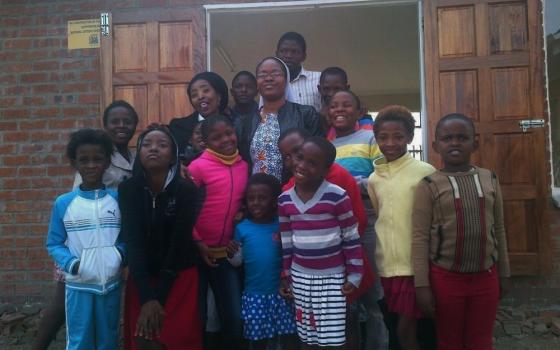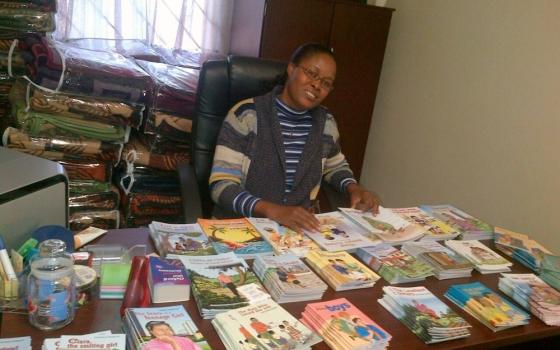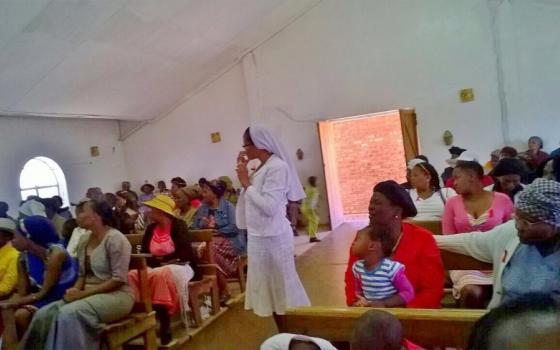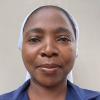Sr. Obehi Ogbeide is a Sister of Notre Dame de Namur who studied nursing and midwifery and works in the health care field. A ministry that contributes to people's care and the healing process is life-affirming for her.
The Nigerian sister currently is a missionary in South Africa, working at the request of the Sisters of Notre Dame de Namur in Zimbabwe and South Africa. Ogbeide coordinates the HIV/AIDS and tuberculosis program in the Diocese of Kroonstad in the Free State Province.
GSR: What motivated you to take up this ministry?
Ogbeide: I think my motivation came from seeing the marvelous work of doctors and nurses reviving sick people and saving their lives. It is very life-giving for me when I am in health care facilities or with people supporting the sick and helpless of our society. I suppose it is a professional calling of its own. [Anchor]
What are your concerns about people living with HIV/AIDS and tuberculosis?
Defaulting treatment is a major concern, and I would like to respond to this question separately for HIV, AIDS and tuberculosis.
People living with HIV live normal lives, as any other person within our community, when they adhere to their treatment faithfully, eat healthy and exercise well. However, when they default treatment over a period of time, their CD4 count [white blood cells that fight infection] becomes low, resulting in a very high viral load. This can lead to the development of AIDS, of which tuberculosis is the most opportunistic infection.
Tuberculosis patients get overwhelmed with the long-term treatment and its side effects, which makes most patients default on treatment. You can imagine all the compound problems that go with it! So we have to continuously provide ongoing support and encouragement for the people living with HIV/AIDS and tuberculosis, as well as for their family members.
Another concern for people living with HIV/AIDS and tuberculosis is stigma and discrimination. Despite the fact that a lot has been done creating awareness and campaigns against stigma and discrimination, there are still so many behavioral challenges encountered by people in our communities and society. These challenges include being labeled; the lack of support or rejection from some family members; and the lack of confidentiality from health care workers.
A third concern is the availability of and access to drugs. Some people in rural areas still have no access to antiretroviral and tuberculosis treatments, which leads to relapse and patients falling terribly sick, which in most cases leads to death. Even though treatments are free and made available, some patients or their relatives sell their medications to drug addicts for a small amount of money.
How do you respond to the call of your ministry?
First and foremost, it is the passion I have for caring and supporting the sick that enables me to respond to the call of my ministry. God has given each person specific potentials in life, and utilizing these potentials lies in each one's ability to use it for the benefit of humanity.
Resources also are key to responding in this ministry. Human and financial resources are needed to achieve the goals and objectives of my ministry. I mobilize volunteers from the local community to support my ministry and to build collaboration with the community and the local church. I sort financial resources from local and international donors to support the cause. People who are sick cannot work to earn money; children left orphaned and vulnerable as a result of HIV/AIDS and tuberculosis have no support system and sometimes become burdens to the community.
Ongoing education of family members, communities and stakeholders also is vital to responding to my ministry.
What is it like to work with people living with these ailments?
I feel very happy and fulfilled when I am able to do something to reduce the burden HIV/AIDS and tuberculosis cause to families, communities and society at large. Sometimes I get overwhelmed by the huge work involved in addressing the problem and the challenges of caring for people, but the positive impact seen from interventions encourages one to persevere.
Is there any hope for them?
Of course there is great hope for them. Treatment is available. In South Africa, where I work, the government provides free treatment to all patients and tries to ensure that treatments are accessible, except in a few rural areas where the clinic is far from the communities.
What is your greatest joy in your ministry?
My greatest joy is when I see people who are sick gradually recover and become healthy and strong again. Health, they say, is wealth. The helplessness that comes with illness disappears when a healing process takes place completely in the human body, and they are able to engage in their daily activities.
What has challenged you most?
Caring for children in the projects for orphans and vulnerable children was a big challenge to me in the beginning because I had not worked solely with children before. I had to develop the skills of working with children along the way.
How do you encourage others in this kind of ministry?
It is not easy work because one needs to have passion, dedication, great patience and self-giving to work with people living with HIV/AIDS and tuberculosis. However, to be able to contribute to the health and well-being of any person is a thing of joy. The fact that you help save lives is just amazing and you become part of Jesus's healing ministry.
[Teresa Anyabuike is a Sister of Notre Dame de Namur. She is the coordinator of Catholic Community Self-Help Association, a department in Justice Development and Peace Mission, Ilorin diocese, Kwara state.]



